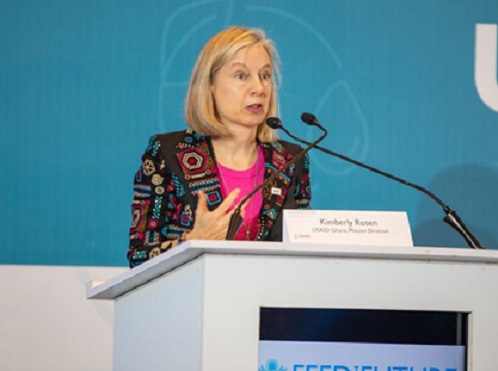Kimberly Rosen
A climate financing conference has begun in Accra highlighting the pressing need to bolster climate funds to achieve the country’s Nationally Determined Conditions (NDCs).
The three-day conference which commenced on Tuesday, February 20, 2024 on the theme, “Climate financing in Ghana: Mobilizing Resources For Adaptation and Mitigation” forms part of the U.S. Agency for International Development (USAID) Feed the Future activities.
It brought together stakeholders including policy makers and development partners as well as farmers to deliberate and share ideas on climate financing.
USAID Mission Director, Kimberly Rosen, speaking at the conference, said climate change is a global crisis that affects 17 African countries out of the world’s 20 most climate-vulnerable countries.
Ms. Rosen indicated that climate change disproportionately impacts people living in poverty, and those who are marginalized stressing that responding to the climate crisis will protect valuable natural resources and create opportunities for the rural poor to adapt and benefit from new approaches and economic opportunities.
The USAID Mission Director, touching on Ghana’s progress said the country is already a leader in combating climate change.
“Ghana is the second country in Africa to receive payments from the World Bank trust fund for reducing emissions from deforestation and forest degradation.
Ghana has committed to 31 mitigation and adaptation actions across seven economic sectors in its Nationally Determined Contributions, or NDCs. The NDCs have been instrumental in outlining Ghana’s comprehensive framework for climate action,” she said.
Ms. Rosen, however, noted that the resources required to implement these goals remain a critical concern.
Ghana is receiving an average of below 10% of the required investments to finance climate change programmes.
“According to the United Nations Framework Convention on Climate Change, climate finance flows in Ghana averaged only 5-9 percent of the required investment,” she said.
She said the country’s economy relies heavily on agriculture, thus building resilience is crucial for food security, poverty reduction, and economic growth, especially for the country’s growing population.
“To improve Ghana’s agriculture and food systems, we need new funding models and partnerships to attract investments in climate-friendly solutions,” she added.
Ms Rosen said the initiatives USAID supports in the country are already working to address credit constraints and climate change effects in the country’s agriculture sector.
“USAID’s bottom line goal is to help farmers grow more food, even in the face of longer droughts, changing rain patterns, and more intense heat, flooding, and pests.
Together we can unlock climate capital to build a more climate resilient agricultural sector in Ghana,” she said.
By Jamila Akweley Okertchiri

